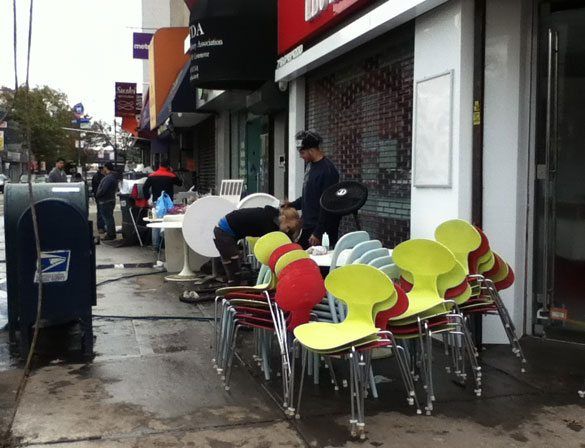Sandy Aid May Be Flowing, But Local Businesses Say It’s Not Fast Enough

Despite the recent passage of a $50 billion federal emergency funds package for victims of Hurricane Sandy, there is lingering skepticism in Southern Brooklyn that the aid will alleviate the ongoing struggles in this badly battered corner of the city.
Local elected officials have touted the passage of the federal aid package as a key step in the region’s recovery from a storm that caused an estimated $20 billion in damage in New York City. Mayor Michael Bloomberg recently announced plans to use the first installment of federal aid, about $1.8 billion, to set up grant and loan programs for homeowners and businesses badly damaged by the storm.
But after nearly four months of seeking Sandy aid from the government, some business owners and organization heads in Southern Brooklyn say the federal Small Business Administration (SBA), which makes emergency loans available to Sandy victims, has been slow to respond to the crisis.
“I’ve been around a while, I know passing money through Congress or passing legislation that allocates resources is no guarantee that those resources will end up where they’re needed most,” said Manny Dominguez, 64, a program manager with the Amethyst Women’s Project, a Coney Island organization that works with HIV-positive women out of its Mermaid Avenue office.
Amethyst, financially vulnerable after a recent loss of $200,000 in federal funding, was not eligible for help from the Federal Emergency Management Agency and got referred to the SBA for a loan.
But with its shaky financials, Amethyst was not in a position to borrow money. Dominguez, who along with Aida Leon, the organization’s founder and executive director, has been working as a volunteer since December 31. They scraped together enough money for rent and utilities in February, but face an uncertain future.
Rovshan Danilov, the owner Arbuz Frozen Yogurt in Sheepshead Bay, applied for a loan of about $100,000 from SBA within a week of the storm, which pushed more than four feet of water into his café and caused significant structural and cosmetic damage to the Sheepshead Bay Road business. He didn’t hear a word from SBA until earlier this month, when he was told he had a week to gather extensive paperwork related to the business, some of which was destroyed in the storm.
“It’s basically impossible to do in seven days,” Danilov said.
He missed the deadline and went to the back of the line at SBA, which is working through a significant backlog of loan applications.
Danilov said he suffered at least $350,000 in damage from Sandy. He’s been back up and running since the middle of January, but sales have been down more than 30 percent as the neighborhood works to get back on its feet.
Danilov has struggled with SBA, but had much better time getting aid from the city. In the days after the storm, he applied for a $25,000 emergency loan from the Department of Small Business Services. The money was approved and allocated, with a $10,000 matching grant, in about a month.
“There’s this notion in the small business community that whenever you’re working with a city entity there’s a lot of obstacles and it’s always going to take time and effort,” Danilov said. “Really here, I didn’t see a lot of problems.”
Nino Russo, an owner of Gargiulo’s Restaurant, a Coney Island institution since 1907, said he’s been buried under a mound of government paperwork in the storm’s aftermath.
Gargiulo’s, located about two blocks from the Boardwalk, suffered an estimated $3 million loss from Sandy, with nearly 12 feet of water flooding the basement and reaching the first-floor dining room. Russo’s computer system was knocked out, his refrigerators were destroyed and he had to replace a variety of furnishings, among other repairs. Russo dipped into his personal savings and worked hard to get the restaurant back open by December – mostly to send a message that Gargiulo’s wasn’t going anywhere.
Russo’s experience has, to a large degree, mirrored that of Danilov: he got a $25,000 loan from the city for the restaurant, but has struggled with SBA, working for weeks to gather the paperwork necessary to get a $2 million loan from the agency.
“I can see where people give up because of the amount of paperwork,” he said.
Earlier this month, Russo got preliminary approval for a $2 million loan. But there’s no timetable for Russo’s final approval and it will be another 100 days after that before the money arrives.
“Once I get this loan, I can pay my bills, get all this stuff off my back,” Russo said.
Russo is looking ahead to April, when communion parties and weddings will hopefully bring business to his restaurant. But he’s worried about the neighborhood. When he looks around, he sees lingering devastation and he wonders what Coney Island will look like as the busy summer season approaches.
“We’re the only lights on the weekend,” Russo said. “A lot of people are not going to open their doors.”
— Craig Giammona



